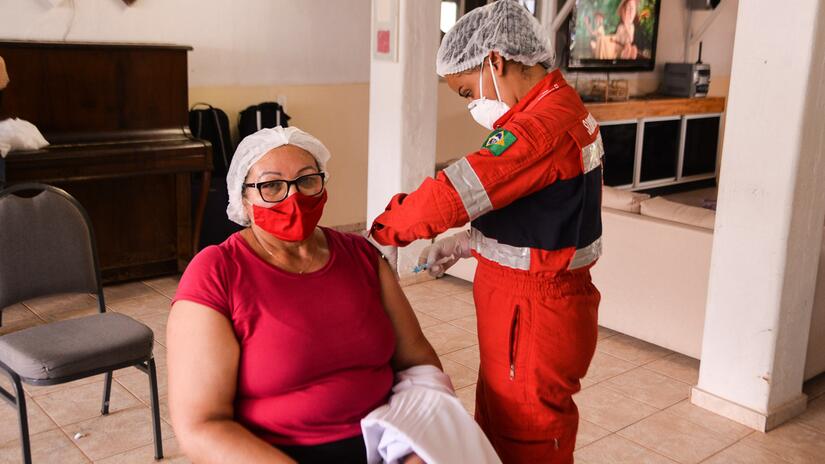Panama City/Geneva, 28 May – The International Federation of Red Cross and Red Crescent societies (IFRC) is warning that the pandemic is far from over in the Americas as cases continue to surge. The region has the highest incidence of COVID-19 cases per 100,000 population globally and has hit the highest peak of deaths since the beginning of the pandemic.
The American continent currently has one of the highest daily death rates worldwide and in South America alone, more than one million people have lost their lives to COVID-19. This accounts for a third of the deaths worldwide.
Newly confirmed cases in the region continue to rise; ten out of the fifteen countries reporting the highest number of COVID-19 cases worldwide are in Latin America and the Caribbean. Uruguay, Argentina and Costa Rica lead the list, followed by Trinidad & Tobago, Suriname, and Brazil, where the pandemic continues to spiral.
Pedro Porrino, IFRC Emergency Health Coordinator in the Americas, said:
“Health systems are at real risk of imminent collapse in many countries, such as Brazil, Argentina, and Uruguay, where cases and deaths are at the highest peak since the beginning of the pandemic. Alarm bells are also ringing in Paraguay, Colombia, and Bolivia.
“What makes this situation even more concerning is the possibility of new, potentially more transmissible, or lethal, variants of the virus to emerge. The more transmission there is, the greater the risk that the virus will mutate and become resistant to existent vaccines, which should concern us all.”
This surge reinforces the need for public health and livelihood protection measures should be maintained and reinforced to keep people safe, especially as the current availability of vaccines is insufficient and the pace of vaccination in most of the continent remains dangerously slow.
As the World Health Assembly comes to a close, the IFRC renews calls for extraordinary measures to increase the production of vaccines and guarantee a better distribution of existing doses globally.
Martha Keays, IFRC Regional Director in the Americas, said:
“Five months after the beginning of the vaccinations worldwide, less than two out of every thousand vaccines have been administered in the poorest countries in the Americas. Leaving the most vulnerable behind in vaccination processes is a moral and public health catastrophe. Millions of lives depend on the efforts to tackle the disparities among and within countries.
All possible measures to boost vaccinations must be considered. This includes the temporary waiver of intellectual property protections for the vaccines, improving the transfer of technology, and ramping up of manufacturing and delivery capacity. Vaccine equity will not just happen. It needs to be engineered and planned for, starting right now.”
To stop the transmission and broader access to vaccines, Red Cross National Societies across the region, supported by the IFRC, continue to be on the frontline of the COVID-19 response, supporting the national vaccination campaigns of their governments, to ensure that no one is left behind.
Press release
Innovative partnership between IFRC and The Nature Conservancy equips Caribbean communities to combat climate crisis
Innovative partnership between IFRC and The Nature Conservancy equips Caribbean communities to combat climate crisis
| Press release

